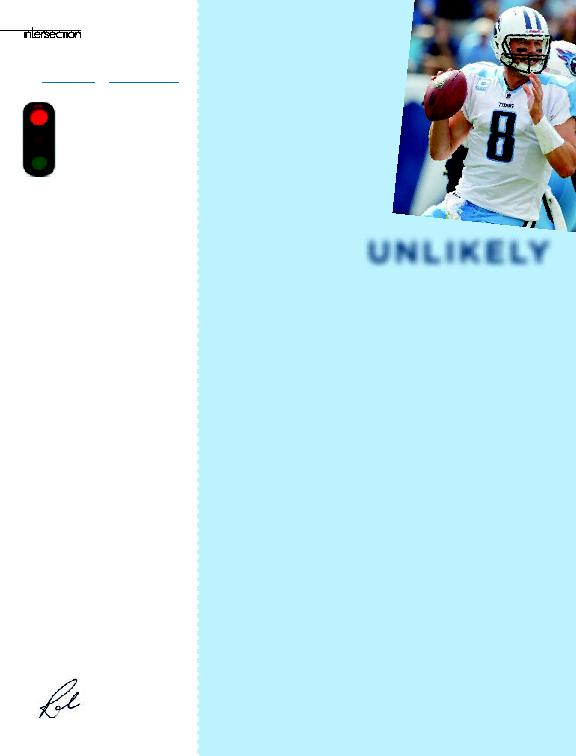
B
eing a NFL quarterback is
the best job there is.
But it's not always easy. There's
plenty of knocks -- from both the
blitzing linebackers and the boo-
ing fans. As the Tennessee Titans quarterback,
I've gone from bench warmer to the starter
in the Super Bowl. There's been plenty of
ups and downs since the Green Bay Packers
drafted me in the sixth round in 1998.
And there's one fellow who taught me
how to keep it all in perspective. Through
the good -- winning the NFC champi-
onship in January 2006 with the Seattle
Seahawks -- and the bad -- injuries
to my shoulder, knee and hand in
the 2006 season.
The lesson came from an unex-
pected person -- a blind leper.
During my sophomore year at
Boston College, I made a 10-day
outreach trip to Jamaica with some
volunteers from my college.
One of the places we ended up
being was a nursing home for lep-
ers. I spent two days there doing
some of the hardest work of my
life. We cleaned everything, sanded
everything and painted everything.
At the end of each day, we would get together in this common area with
about 15 lepers and we'd sing hymns before dinner.
George McVee played the harmonica, which was crazy because he had no
fi ngers.
I don't know how he did it. He had no nose, no eyes, no ears, no
fi ngers. Just these stubs.
I'd say he was in his 60s, but it was hard to say because he was so dis
fi gured.
I had heard about this guy. I had actually seen pictures of him from previous trips.
I thought what everyone else thought: Man, I don't know if I could do this trip.
I didn't know if I could be with a guy who is that grossly dis
fi gured. He was se-
verely deformed. I'm ashamed to say this. But he was hard to look at.
We'd sit there for a half hour singing. There was no other accompanying music
beside George's harmonica. But it wasn't so much the songs. It was what George
would say in between the songs.
One night I came a little late and there was only one seat left. It was right next
to George. They said his leprosy wasn't contagious. But I didn't know. I was a
young kid and I was wondering, "Well, how did he get it?"
So, there I sat next to George. In between songs he'd recite poems he had
written. One poem was titled "My Cup Runneth Over." He'd talk in this broken
English with a thick accent.
Then he'd stand, raise his hands and say, "Thank you Jesus. Thank you Jesus."
I'd listen and I'd be amazed. These people should have been so angry about
what they were born into. What did he have to be happy about? Or thankful
for? Their attitude, George's attitude, was exactly what my attitude should
have been like.
When I got home, I felt so guilty. I didn't even talk about the trip. It was hard to
express it. I felt guilty every time I'd brush my teeth and left the water running. I felt
guilty anytime I left food on my plate. I felt guilty about complaining about anything.
Vantage Point
What type of individual
comes to mind when you
think of a role model?
Most of us might envision a
strong personality who com-
mands respect and attention.
Seems that in our society today, anyone
who is rich and famous also serves as
a role model � this can be good, but in
a lot of ways, we also see how some
celebrities aren't quite so deserving
of such status.
In our lead piece, Matt Hasselbeck, a
professional quarterback in the NFL,
shares his story about how he discovered
a man who would become his role
model through the unlikeliest of circum-
stances. Sometimes the people we aren't
expecting to impact us end
up making the biggest impression on
us. So often, we might miss out on
something signi
fi cant because we aren't
paying attention to the right people.
In the Bible, there's a story about how
a future king was to be chosen. The
prophet Samuel was instructed by God
to look for the individual who was to be
king. After looking toward those who
"looked the part," God told Samuel
he wasn't looking in the right direc-
tion. The instruction given to Samuel
by God is valid for us today � "Peo-
ple look at the outward appearance,
but the Lord looks at the heart"
(1 Samuel 16:7).
Once we get past the outer veneer of
what people want us to see, then we can
see who the real person is; the person
who God sees. And then we'll be able to
choose role models for ourselves that will
be bene
fi cial for our lives and in line with
how God would have us live.
@rreardondc
W W W . S A I N T E R S E C T I O N . O R G
U N L I K E LY
ROLE
MODELS
an interview with
Matt Hasselbeck
as told to Gail Wood
Photo courtesy The Tennessee Titans/NFL
17-20_Intersection_Aug2013_FIN.indd 18
7/16/13 5:27 PM
